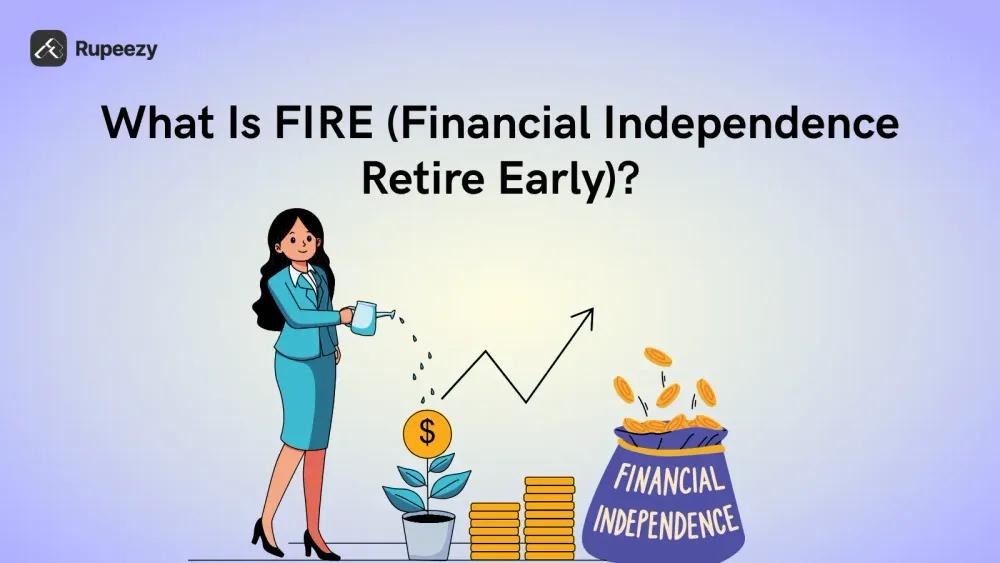What Is FIRE (Financial Independence Retire Early)?


00:00 / 00:00
Time is changing fast, and with this, the need for better financial planning as well. This is one of the primary reasons why more institutions are now focused on financial literacy for students. This is a golden chance for them not just to understand the importance of money but also how they can plan well to have a better future.
Among all these, there is a concept of Financial Independence Retire Early or FIRE, which is catching up fast. But the question is, what is this all about, and why should you be really aware of the same?
So, if you are one who is looking for an answer to what financial independence is, and wants to retire early, then read this guide. Explore your answers and understand how you can move ahead with a well-defined plan that ensures success. So, let us get started here.
What Is FIRE (Financial Independence Retire Early)?
FIRE stands for Financial Independence, Retire Early. It is a movement that focuses on saving and investing aggressively. The main aim of doing this is to achieve financial freedom much earlier than the traditional retirement age.
If you consider FIRE, you are following the core idea of building wealth that is enough for your retirement with the help of proper investing today. In other words, you are aiming to generate sufficient income to cover your living expenses without needing to work for a paycheck.
In simpler terms, the FIRE strategy encourages individuals to save a significant portion of their income. This is often between 50% to 70%. And then, this amount is invested in the income-generating assets like mutual funds or index funds, and even the real estate or REITs.
With time, your money invested in these will grow. You will find the power of compounding actually works for you and offers you returns that build a good corpus to help you retire early.
In India, the concept of Financial Independence Retire Early is gaining popularity. This is more prevalent among young professionals who value time, flexibility, and freedom over long-term job security. They are looking for financial freedom in their life with no limitations involved, especially linked to the life they may live in the future.
How Does the FIRE Movement Work
The FIRE movement focuses on achieving financial freedom through consistent saving, investing, and disciplined money management. It helps the investors to gain a substantial amount of wealth that can ensure that they live a better life in the future. But to attain this, it is important that you understand how to start financial independence and retire early.
So, here is a proper stepwise method that can help you get started on your journey of financial independence, retire early in India:
Step 1: Calculate Your Annual Expenses
Start by making a proper budget for yourself. In this, you would need to do the following:
List all your yearly expenses, including rent, groceries, utilities, EMIs, and lifestyle costs.
Identify which os these are short-lived and might not be needed in the future.
This gives you clarity. This gives you an idea about the money you need every year. All this is based on certain assumptions. The main thing is that you will live a similar kind of life to today. So standard and style will remain the same.
Step 2: Find Your FIRE Number
Your FIRE number is the start of your financial planning. This is the actual amount that will help you gain financial independence. This amount will change in the future based on various factors. So, here you would need to multiply your annual expenses by 25.
So, the main rule here is: Annual expenses × 25 = FIRE corpus
This is based on the simple 4% withdrawal rule. This suggests that you can withdraw 4% of your investments each year without depleting your savings.
Step 3: Save and Invest Aggressively
To reach Financial Independence, Retire Early, aim to save between 50% and 70% of your income. There are various options for you to invest in. This is where you would need to generate a proper portfolio. With time, you would also need to do the portfolio rebalancing as well.
Some of the great investment options are equity and debt funds, index funds, EFTs, and other forms of long-term investment plans.
Step 4: Control Your Expenses
It is important that you plan well. Start with simple steps. Minimize unnecessary spending and lifestyle inflation. The more you save, the faster you can achieve your FIRE goal. This is possible when you spend money on things you actually need. Avoid spending on unwanted things, and you will be in a better position.
Step 5: Track and Rebalance Regularly
Once you invest, your work has now started. You would need to check and work on your portfolio on a regular basis. Hence, you would need to make the adjustments based on the market. This will ensure that you gain better from the portfolio and reach your FIRE early.
Types of FIRE Strategies
Not everyone pursuing FIRE follows the same approach. These are based on various conditions. The top types to know are as follows:
Type of FIRE | Aim | Best Suited For | Lifestyle Approach | Savings Needed |
Lean FIRE | Early retirement at minimal cost. | Individuals are fine with a frugal living style. | Simple and disciplined | Low |
Fat FIRE | Retire early with the same comfort and luxury. | High-income earners and lifestyle seekers. | Comfortable and flexible | High |
Barista FIRE | Financial freedom with part-time work. | People who love to work even casually. | Balanced and semi-retired | Moderate |
Coast FIRE | Invest early and compound with less work. | Young professionals who save early and want less work later. | Relaxed and strategic | Medium to high |
Slow FIRE | A gradual path to financial independence without extreme saving. | Individuals who prefer stability and a slower journey to freedom. | Steady and sustainable | Moderate |
Pros and Cons of the FIRE Movement
Like any financial strategy, the Financial Independence, Retire Early (FIRE) also has some of its own pros and cons. Knowing them is quite important. This will help you chart your path to growth and success in a better manner.
So, let us now explore the pros and cons here.
Pros
Helps achieve financial freedom early.
Offers control over life and future,
Assists in early retirement planning.
Offers flexibility and clarity on savings for the future.
Helps create long-term wealth for a better lifestyle.
Teaches better savings and investing.
Reduces financial stress and dependence on traditional employment.
Helps with mindful savings and investments.
Cons
Issues with consistency in savings can be there.
High savings needed to maintain lifestyle.
Burnout is possible, which can be bad.
It can be socially or emotionally challenging.
Not suitable for everyone, due to costs.
Conclusion
The Financial Independence, Retire Early (FIRE) is not just a plan. But it is a way to chart your path to better financial freedom in later years. This is what you need to plan to ensure you stay ahead. But to plan this, you need proper support and guidance. This is where Rupeezy can help you. So, start your FIRE journey today to achieve true financial freedom.
FAQs
What is the 4% rule in FIRE?
It suggests you can withdraw 4% of your investment corpus yearly to cover expenses without running out of money.
Can FIRE be achieved in India?
Yes. It can be done with proper planning and disciplined saving for the right investments.
How much should I save monthly for FIRE?
Typically, you need to invest 50-70% of your income for FIRE.
Is FIRE suitable for middle-income earners?
Yes, FIRE is one of the best choices for middle-income earners as this offers you safety.
Which investments are best for FIRE?
Diversified mutual funds, index funds, and long-term equity investments work best for building a FIRE portfolio.
The content on this blog is for educational purposes only and should not be considered investment advice. While we strive for accuracy, some information may contain errors or delays in updates.
Mentions of stocks or investment products are solely for informational purposes and do not constitute recommendations. Investors should conduct their own research before making any decisions.
Investing in financial markets are subject to market risks, and past performance does not guarantee future results. It is advisable to consult a qualified financial professional, review official documents, and verify information independently before making investment decisions.

All Category










